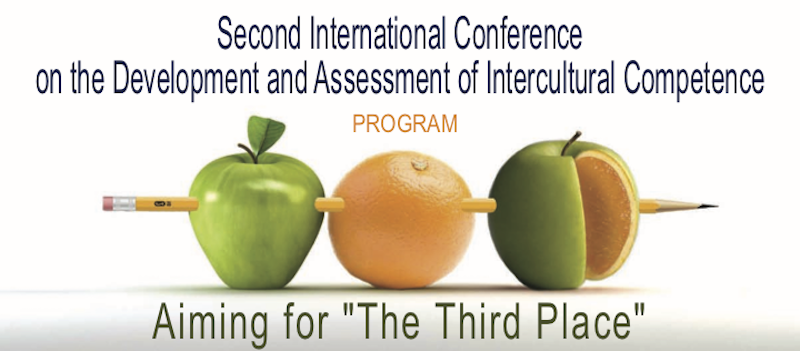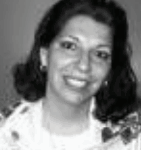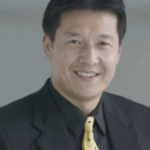
2010 Second International Conference on the Development and Assessment of Intercultural Competence
Aiming for “The Third Place”
Intercultural Competence through Foreign Language Teaching and Learning
Held January 29-31, 2010 ~ The Hotel Arizona ~ Tucson, Arizona
To download the program, click here
Intercultural competence is [the ability] “to see relationships between different cultures – both internal and external to a society – and to mediate, that is interpret each in terms of the other, either for themselves or for other people.” It also encompasses the ability to critically or analytically understand that one’s “own and other cultures’” perspective is culturally determined rather than natural. – Byram, M. (2000). Assessing Intercultural Competence in Language Teaching. Sprogforum, 18 (6), pp. 8-13
Globalization, having brought individuals in contact with one another at an unprecedented scale, has also brought forth a general challenge to traditionally recognized boundaries of nation, language, race, gender, and class. The challenge moves in two directions simultaneously: on the one hand, distinctions that were unnoticeable before have been rendered visible, and in the opposite direction, similarities across traditional boundaries have been recognized. The end result in both cases is that boundaries of social practice are being re-negotiated, re-assessed, and re-considered. For those living within this rapidly changing social landscape, intercultural competence–as defined by Michael Byram above–is a necessary skill, and the cultivation of such intercultural individuals falls on the shoulders of today’s educators. They should provide students with opportunities to help them define and design for themselves their “third place” or “third culture,” a sphere of interculturality that enables language students to take an insider’s view as well as an outsider’s view on both their first and second cultures. It is this ability to find/establish/adopt this third place that is at the very core of intercultural competence.
The conference aims to bring researchers and practitioners across languages, levels and settings to discuss and share research, theory, and best practices and foster meaningful professional dialogue on issues related to Intercultural Competence teaching and learning.
Keynote and Plenary Presentations
Keynote Address
The Symbolic Dimension of Intercultural Competence
Speaker: Claire Kramsch, University of California, Berkeley (United States)
Claire Kramsch, Ph.D., is Professor of German and Foreign Language Acquisition at the University of California, Berkeley, and Founding Director of the Berkeley Language Center. Among her many publications is an edited volume, Language Acquisition and Language Socialization: Ecological Perspectives (Advances in Applied Linguistics Series, Continuum International, 2003); most recently she completed a manuscript on The Multilingual Subject. Her awards include the ACTFL Nelson Brooks Award for the teaching of culture; the MLA Kenneth Mildenberger Prize for Outstanding Research in the teaching of foreign languages and literatures; the Goethe Medal; the MLA Distinguished Service Award; and a UC Berkeley Distinguished Teaching Award. Dr. Kramsch is past President of the American Association of Applied Linguistics, was co-editor of the journal Applied Linguistics and serves on CERCLL’s National Advisory Board.
Abstract: While communicative competence is characterized by the negotiation of intended meanings in authentic contexts of language use, intercultural competence has to do with far less negotiable discourse worlds, the “circulation of values and identities across cultures, the inversions, even inventions of meaning, often hidden behind a common illusion of effective communication” (Kramsch et al 2008:15). The self that is engaged in intercultural communication is a symbolic self that is constituted by symbolic systems like language as well as by systems of thought and their symbolic power. This symbolic self is the most sacred part of our personal and social identity; it requires careful positioning, delicate facework, and the ability to frame and re-frame events. The symbolic dimension of intercultural competence calls for a post-structuralist research and teaching approach that is discourse based, historically grounded, aesthetically sensitive, and that takes into account the actual, the imagined and the virtual worlds in which we live. With the help of concrete examples from foreign language classrooms, the paper will attempt to redefine the notion of third place (Kramsch 1993) as symbolic competence.
References
-
Kramsch, Claire, Levy, Danielle & Zarate, “Genevieve. Introduction Generale.” In Zarate, G., Levy, D., & Zarate, G. (Eds.) Précis du plurilinguisme et du pluriculturalisme. Paris: Editions des archives contemporaines, 2008.
-
Kramsch, Claire. Context and Culture in Language Teaching. Oxford University Press, 1993.
Plenary Address 1
The World is Your Oyster: Metaphor- and Space-Making in Mexico City
Speaker: Vicki Galloway, Georgia Institute of Technology (United States)
 Vicki Galloway, Ph.D., is a Professor of Spanish and Associate Chair for Research and Assessment in the School of Modern Languages at Georgia Institute of Technology.
Vicki Galloway, Ph.D., is a Professor of Spanish and Associate Chair for Research and Assessment in the School of Modern Languages at Georgia Institute of Technology.
Abstract: Lackoff and Johnson remind us that “metaphor is pervasive in everyday life… Our ordinary conceptual system, in terms of which we both think and act, is fundamentally metaphorical in nature.” In the context of a faculty-led study abroad program in Spanish for Business and Technology in Mexico City, this paper will focus on sojourners’ use of conceptual metaphors as “tour guides” in the third spaces of critical self reflection and meaningful negotiation and articulation of difference and through the chaotic tensions of the “web of interlocutions” (Kumaravadivelu, 158) that is Mexico’s contemporary culturescape.
References
-
George Lakoff, G. and M. (1980). Metaphors We Live By. Chicago: Univ. of Chicago Press.
-
Kumaravadivelu, B. (2008). Cultural Globalization and Language Education. New Haven: Yale University Press.
Plenary Address 2
An Associative Perspective of Communication in the Arab World: Implications for Identity, Teaching and Public Diplomacy
Speaker: R. S. Zaharna, American University (United States)
 R. S. Zaharna, Ed.D., is an Associate Professor in the School of Communication at American University.
R. S. Zaharna, Ed.D., is an Associate Professor in the School of Communication at American University.
Abstract: In this presentation, I explore the diversity that characterizes the people and societies across the Arab world as well as the shared perspective of communication that puts a premium on relations and social context. While diversity magnifies the difficulty of achieving intercultural competence, understanding the importance of relations and social context is a pivotal key for gaining communication competence and navigating the cultural terrain. To capture the significance of relations and social context, an associative perspective of communication is presented. I highlight associative features found in the Arabic language, Islam and dominant social norms. I discuss how the associative perspective helps define intra-cultural communication competence, and by extension, corresponding attributes and attainable goals for individuals seeking intercultural communication competence. My presentation concludes with implications for identity, teaching and public diplomacy.
Plenary Address 3
What is in Common: English Fever in China and Chinese Heat in America? Intercultural Communicative Competence
Speaker: Jun Liu, University of Arizona (United States)
 Jun Liu, Ph.D., is a Professor of English and Head of the Department of English at the University of Arizona. He is also Director of the Confucius Institute of the University of Arizona (CIUA) and past President of Teachers of English as a Second or Other Language (TESOL).
Jun Liu, Ph.D., is a Professor of English and Head of the Department of English at the University of Arizona. He is also Director of the Confucius Institute of the University of Arizona (CIUA) and past President of Teachers of English as a Second or Other Language (TESOL).
Abstract: There are signs that the global prominence of English may fade within the foreseeable future, and the leading position of English as the language of the world market is diminishing as the demand for educational resources in languages such as Chinese grows. Indeed, Mandarin has emerged as the new must-have language in many Asian countries, as well as in Europe and the United States. An estimated 30 million people are learning Chinese worldwide and the number will triple in the next few years. There is a critical need for highly qualified Chinese teachers to fill the void. However, the linguistically competent teachers, or native speakers, have encountered numerous challenges in teaching their own languages in foreign language contexts. Largely responsible for such challenges is the intercultural communicative incompetence that has been identified as the No. 1 factor affecting the effectiveness of teaching. As the key designer of the Standards for Teachers of Chinese to Speakers of Other Languages (TCSOL), Liu will argue why the theoretical framework of communicative competence should be expanded to include intercultural competence, and why and how intercultural competence should be the key component in educating global language teachers.
Workshops
Workshop 1: Assessing Intercultural Competence during Study Abroad
Facilitator: Peter Ecke, University of Arizona (United States)
Summary In this session, I examine techniques for the assessment of intercultural competence during study abroad. I present data from self-assessment questionnaires and journals from participants of a summer study program in Europe to illustrate the potential of these techniques for the assessment and teaching of intercultural competence during study abroad.
Workshop 2: Leading and Teaching in the Cultural Third Place: Strategies for Building and Maintaining “Other” Places
Facilitator: Nicholas Ferdinandt, University of Arizona (United States)
Summary This workshop aims to explore the nature of cultural third places in order to foster a desire to build and maintain these physical places of mutuality and dialogue. Also, participants will be given the opportunity to develop personal leadership principles and strategies for their day-to-day social and work environments.
Workshop 3: Cultural Competency for Educational Leaders
Facilitator: Lee Mun Wah, StirFry Seminars & Consulting (United States)
Summary With schools, workplaces and communities becoming increasingly more diverse, cultural competency and the elimination of cultural and personal bias become correspondingly important issues. Through personal stories, group exercises, and films, participants learn awareness of cultural differences, cross-cultural communications skills, community development expertise, and an understanding of social issues and contexts.
Post-conference workshops
Workshop 4: Building Intercultural Sensitivity and Developing Intercultural Competence in Foreign Languages
Facilitators: Elisabeth Arevalo-Guerrero, University of Maryland College Park (United States), Maria Ines Quiroga, University of Maryland Baltimore County (United States)
Summary Under the umbrella of Bennett’s (1993) Developmental Model of Intercultural Sensitivity and Byram’s (1997) Model Intercultural Communicative Competence Model, this workshop presents an intercultural approach to teaching foreign languages. Descriptions of class activities in face-to-face and computer-mediated interaction with native speakers will be presented along with samples of experiential activities.
Workshop 5: Introducing Children and Adolescents to World Cultures and Languages
Facilitator: Kathy G. Short, University of Arizona (United States)
Supporting Facilitors: Ke Huang, University of Arizona (United States), Junko Sakoi, University of Arizona (United States), Richard Clift , University of Arizona (United States)
Summary Literature provides an opportunity for children and adolescents to immerse themselves in conceptual ways of thinking and living in the world. Participants will explore Language and Culture Book Kits from particular cultures and will experience a wide range of engagements that encourage students to explore global cultures and develop intercultural competence.